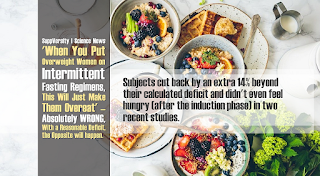Ever Wondered Why the Fat Keeps Falling Off When You Embark on Intermittent Fasting Regimens? Calories, Bro!

Whether it's a mere reduction in energy intake or carbohydrate fasting, both lead to significant reductions in energy intake beyond the weekly dieting goal set by the scientists. What's going on in these two studies in overweight women? I know that 99% of the SuppVersity readers will be smart enough not to believe that calories don't count. Accordingly, it may be news, but probably not very surprising for most of you to hear that a recent (re-)analysis of food logs from two intermittent fasting studies underlines how effective intermittent fasting really is when it comes to reducing people's energy intake. In previous studies researchers have already been able to show that the vast majority of dieters do not overeat and consume more than the ~1500kcal/d you may be missing on a fasting day. Learn more about fasting at the SuppVersity Monthly 5-Day Fast Works "Lean Gains" Fast Works Habits Determine Effects of Fasting Protein Modified Fast ...


